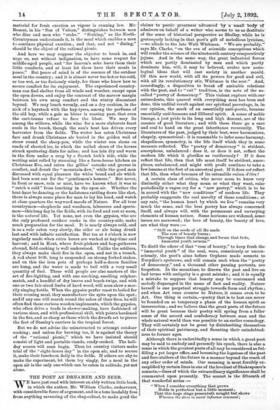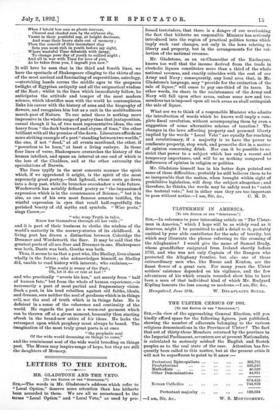1.11.1; POET AS DREAMER AND SEER.
WIi have just read with interest an ably written little book, in which the author, Mr. William Clarke, endeavours, with considerable force of argument, and in a tone laudably free from anything savouring of the rhapsodical, to make good the claims ta poetic greatness advanced by a small bay of admirers on behalf of a writer who seems to us as destitute of the sense of historical perspective as Shelley, while he is grotesquely lacking in that poet's gift of melodious lyricism,
—we allude to the late Walt Whitman. "We are probably,' says Mr. Clarke, "on the eve of scientific conceptions which will render the science of the nineteenth century comparatively jejune. And in the same way, the great industrial forces. which are partly dominated by man and 'which partly dominate him, will, it may be believed, evolve new socio- logical ideas that will cast society in another mould.. Of this new world, with all its powers for good and evil, with all its revolationary stir, Whitman is the seer." And, accordingly, a disposition to break off amicable relations- with the past, and to "cut" tradition, is the note of the so.
called "poetry of democracy." This violent rupture with our antecedents, this quarrel with everything man has been and done, this unfilial revolt against our spiritual parentage, is, in our opinion, the mark of an essentially anti-poetic, because- essentially anti-humane and illiberal spirit. A sense of noble lineage, a just pride in its long and high descent, are of the' essence of good literature ; and with these there go a care- and zeal to hand on the great inheritance reverently. The literatures of the past, judged by their best, were harmonious,. shapely, symmetrical : it is reasonable to infer some harmony,. shapeliness, symmetry, in the life itself which they in some- measure reflected. The "poetry of democracy" is strident,. amorphous, unbalanced : does it, or does it not, reflect the
modern life which it glorifies so vociferously P If it does. reflect that life, then that life must itself be strident, amor- phous, unbalanced, and might with profit continue to take a. few lessons at the feet of an ancestral past. If it does not reflect that life, then what becomes of its ostensible raison d'être?
A certain class of critics, who never seem to know very distinctly either what they mean or what they want, raise- periodically a vague cry for a "new poetry," which is to be
in accord with the "new conditions" of modern life. They- probably exaggerate the real novelty of those conditions ; at. any rate, "the human heart by which we live" remains very-
much the same, and the best poetry has always concerned itself, and always will, with the permanent and unvarying elements of human nature. Some horizons are widened, some- issues are narrowed ; the love of beauty, the beauty of love,. are what they were :-
"Still on the seeds of all He made The rose of beauty burns ; Through times that change and forms that fade, Immortal youth returns."
To distil the odour of that "rose of beauty," to keep fresh the "immortal youth" of the soul, were, consciously or uncon- sciously, the poet's aims before Orpheus made sonnets top. Eurydice's eyebrows, and will remain such when the "poetry of democracy," and a thousand other passing portents, are forgotten. In the meantime, to disown the past and live on bad terms with antiquity is a great mistake ; and it is equally a mistake to suppose that beauty may be contemned an& melody disparaged in the name of fact and reality. Nature herself is one perpetual struggle towards form and rhythm ; and when Art runs counter to Nature, it ceases even to be Art. One thing is certain,—poetry that is to last can never be founded on so temporary a phase of the human spirit as - insurrection ; and we believe that the great poets of the future will be great because their poetry will spring from a fuller
sense of the accord and confederacy between man and the whole natural world than was possible to an earlier cosmology. They will certainly not be great by disinheriting themselves.
of their spiritual patrimony, and flaunting their unindebted- nese to former ages.
Although there is undoubtedly a sense in which a great poet may be said to embody and personify his epoch, there is also a, sense in which the greatest poets of all may be considered as ful- filling a yet larger office, and becoming the legatees of the past
and fore-stallers of the future lit a manner beyond the reach of any other order of minds. Our meaning is most forcibly ex- emplified by certain lines in one of the loveliest of Shakespeare'a sonnets,—lines of which the extraordinary significance shall be- commented upon presently. The sonnet is the fifteenth a that wonderful series :— "When I consider everything that grows Holds in perfection but a little moment ;
That this huge stage presenteth nought but shows Whereon the stars in secret influence comment;
When I behold how men as plants increase, Cheered and checked even by the selfsame sky, Vaunt in their youthful sap, at height decrease, And wear their brave state out of memory ; Then the conceit of this inconstant stay Sets you most rich in youth before my sight, Where wasteful Time debateth with decay, To change your day of youth to sullied night ; And all in war with Time for love of you, As he takes from you, I ingraft you new."
It will here be seen that in the third and fourth lines, we have the spectacle of Shakespeare clinging to the skirts of one .of the most ancient and fascinating of superstitions, astrology, —stretching hands across the middle ages to the gorgeous -twilight of Egyptian antiquity and all the enigmatical wisdom of the East ; whilst in the lines which immediately follow, he anticipates the attitude and temper of the most modern science, which identifies man with the world he contemplates, links his career with the history of suns and the biography of towers, and recognises him but as a unit in the multitudinous march-past of Nature. To our mind there is nothing more impressive in the whole range of poetry than that juxtaposition, easual though it be, of two most representative ideas, the one 'hoary from "the dark backward and abysm of time," the other
brilliant with all the promise of the dawn. Literature affords no more striking example of a poet "standing between two worlds," the one, if not "dead," at all events moribund, the other, if " powerless to be born," at least a living embryo. In those -four lines of verse, Shakespeare overarches the history of the
human intellect, and spans an interval at one end of which is the lore of the Chaldees, and at the other extremity the -speculations of Darwin.
The lines typify in the most concrete manner the spirit which, if we apprehend it aright, is the spirit of the most supremely great poetry,—that Igdrasil, whose roots go down into a deep past, while its branches overshadow a wide future. Wordsworth has notably defined poetry as "the impassioned .expression which is in the countenance of Science ; " but it is also, as one of his own most famous sonnets testifies, the wistful expression in eyes that recall half-regretfully the perished beauty of old myths and symbols. "Wise poets," -sings Carew,—
" who wrap Truth in tales, Know her themselves through all her veils ;" and it is part of their business to clothe the wisdom of the world's maturity in the nursery-stories of its childhood. A living poet has drawn a distinction between Coleridge the
Dreamer and Wordsworth the Seer. It may be said that the greatest poets of all are Seer and Dreamer in one. Shakespeare was both, Dante was both, Goethe was both.
Thus, it seems to us that a poet who, like Shelley, lives almost -wholly in the future; who acknowledges himself, as Shelley did, unable to read history with interest; who exclaims,— " The world is weary of the Past ; Oh, let it die or rest at last !"
-and who practically "averts his ken," not merely from "half of human fate," but from the whole of human experience,—is necessarily a poet of most partial and fragmentary vision. Such a poet, in his loud rebellion against old faiths, ideals, and dreams, sees neither the soul of goodness which is in things
evil, nor the soul of truth which is in things false. He is deficient in a sense of the coherence and continuity of the world. He regards the past as a worn-out garment which can be thrown off at a given moment, humanity then starting afresh in the brand-new attire of his ideas. He lacks the retrospect upon which prophecy must always be based. The imagination of the most truly great poets is at once
"the prophetic soul Of the wide world dreaming on things to come," and the reminiscent soul of the wide world brooding on things past. The Muses may inspire songs of hope, but they are still the daughters of Memory.











































 Previous page
Previous page